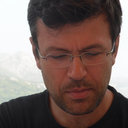About
20
Publications
1,959
Reads
How we measure 'reads'
A 'read' is counted each time someone views a publication summary (such as the title, abstract, and list of authors), clicks on a figure, or views or downloads the full-text. Learn more
51
Citations
Introduction
Skills and Expertise
Publications
Publications (20)
The article investigates what happens when philosophy (of science) meets and begins to establish connections with two formal research methods such as game theory and network science. We use citation analysis to identify, among the articles published in Synthese and Philosophy of Science between 1985 and 2021, those that cite the specialistic litera...
Using quantitative methods, we investigate the role of logic in analytic philosophy from 1941 to 2010. In particular, a corpus of five journals publishing analytic philosophy is assessed and evaluated against three main criteria: the presence of logic, its role and level of technical sophistication. The analysis reveals that (1) logic is not presen...
The chapter provides the book’s main explanandum. In the 1950s Oxford and to a lesser extent Cambridge were the mecca of analytic philosophy, and Wittgenstein—the later Wittgenstein—was the champion of that philosophical tendency: a great majority of scholars in the Oxbridge analytic community shared a body of methodological and theoretical points...
The earliest attacks against the later Wittgensteinian tradition were part of the “intellectual war” between the London School of Economics and the Universities of Oxford and Cambridge. The main characters of this story were Popper, Watkins and, above all, Ernest Gellner, the author of Words and Things (1959). Gellner’s philosophical and sociologic...
The early reception of Wittgenstein in the United States was characterised by incomplete and partly distorted understanding and, in particular, by a confusion between Wittgenstein’s philosophy and Carnap’s logical positivism. This is shown by providing some data concerning the articles published in The Journal of Philosophy and The Philosophical Re...
The chapter summarises the main lines of the explanation provided in this book of the decline of Wittgenstein in the history of analytic philosophy. Then it briefly focuses on two features of the last decades. First, even after the decline happened, Anglo-American academic culture has experienced, as it were, a sort of rediscovery of various forms...
Arguably, in the 1950s and 1960s there were grounds to claim that Quine’s attack on Carnap’s analytic-synthetic distinction could not be automatically applied to Wittgenstein. However, with very few exceptions, the Wittgensteinians did not provide a commensurate response to Quine. Arguably, they were not fully aware of the historically objective co...
Wittgenstein regarded necessary statements as grammatical rules in disguise, and he also argued against the very notion of necessary fact. In the Quinean, science-oriented philosophical scenario of the 1970s and 1980s, Kripke’s successful rehabilitation of necessary facts created a space, which was occupied mainly by David Lewis and his methodologi...
The period 1951–1970 was characterised by the “advent” of the later Wittgenstein in the United States, thanks to well-informed authors such as Sellars and Cavell. In the context of the new rigourism in the humanities, analytic philosophers reacted with hostility. The chapter focuses on three main episodes or groups of episodes: Putnam’s 1962 attack...
This book aims to explain the decline of the later Wittgensteinian tradition in analytic philosophy during the second half of the twentieth century. Throughout the 1950s, Oxford was the center of analytic philosophy and Wittgenstein – the later Wittgenstein – the most influential contemporary thinker within that philosophical tradition. Wittgenstei...
There is a rather widespread consensus, among historians of philosophy, concerning the decline of Wittgenstein amid recent analytic philosophy. However, the exact import of such a decline, its chronological development, as well as its causes and several other features, are difficult to ascertain with the traditional methods of the history of philos...
In this paper we illustrate a system aimed at solving a long-standing and challenging problem: acquiring a classifier to automatically annotate bibliographic records by starting from a huge set of unbalanced and unlabelled data. We illustrate the main features of the dataset, the learning algorithm adopted, and how it was used to discriminate philo...
As editors of this special issue, we thought it useful to ask the same three questions on the history of late analytic philosophy to some philosophers. (1) What are the main philosophical and metaphilosophical similarities and differences between early analytic philosophy and late analytic philosophy? (2) Is it possible to identify a mainstream in...
: According to McDowell, in Empiricism and the Philosophy of Mind the myth of Jones has the purpose of completing the account of experience that Sellars needs to argue against traditional empiricism. In particular, on McDowell's view the myth of Jones should explain how to conceive of non-inferentially knowable experiences as containing proposition...
In the 1780s the anatomist Vincenzo Malacarne discussed the possibility of testing experimentally whether experience can induce significant changes in the brain. Malacarne imagined taking two littermate animals and giving intensive training to one while the other received none, then dissecting their brains to see whether the trained animal had more...
The paper is concerned with Wittgenstein’s attitudes towards various forms of naturalism. On the one hand, Wittgenstein’s antinaturalism is based on the idea that there is a deep divide between science and philosophy. The paper argues that such a methodological claim cannot be criticized by resorting to Quine’s attack to analyticity, for the Wittge...

























